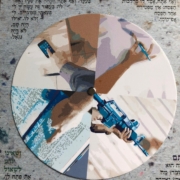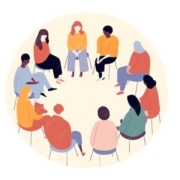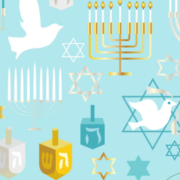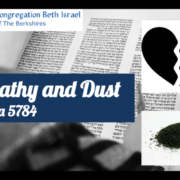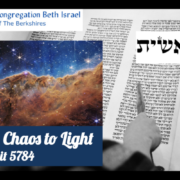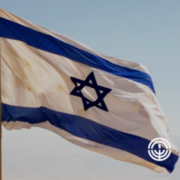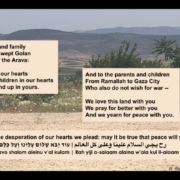“Why is this night different from all other nights?” That’s the question that launches us into seder. Many Pesach customs are designed to prompt questions. We ask why, and we plumb our traditions for answers, and meaning, and the nourishment our souls most need.
As a rabbi I am here to serve everyone in our community. I aspire to be here for you in sickness and in health, in celebration and in sorrow. I have the holy opportunity to learn and to teach, to rejoice and to mourn, and to build community with each and every one of you. I take this covenant seriously, and it is one of the things I love most about the work that I am blessed to do. I will always strive to approach any differences we may have with curiosity and an open heart. And I always want to hear from you about where you are and what matters to you.
Many of you have asked what I think about what’s happening in Gaza and Israel. In a word, I am heartbroken. Every time I pray, these days, I pray with all my heart for a negotiated bilateral ceasefire, return of all hostages, and an end to enmity between Israelis and Palestinians.
The big mitzvah associated with Chanukah is pirsumei nisa, “publicizing the miracle.” Tradition teaches us to place the Chanukah lights someplace where they will be seen. (Unless we fear for our lives, in which case tradition permits us to keep our light under the proverbial bushel.) We display our lights to publicize the miracle: the oil that lasted until new oil could be made; the leap of faith that led us to kindle light in the first place; the miracle of hope in times of despair.
Especially this year, holding fast to hope and to Jewish joy feels like a radical act… and a necessary one.
“…Hurt people hurt people, and everybody in this story is hurting…”
“…The primordial light shines in the darkness not of space but of spirit. And when God declares it good, God is saying that there is capacity for good in this world. God is saying that we can choose to create, not just to destroy…”
I know that many of us are feeling helpless. My friend and colleague Rabbi Jay Michaelson notes that “The hopelessness feeds [the extremists’] narrative that there can be no peace.” I invite us therefore to resist hopelessness as best we can. There are things we can do to make things better. They may feel small, but they are real.
How can we rejoice with the Torah at a moment like this? And yet our tradition calls us to do precisely that.
Dear CBI community,
“My heart is in the East, and I am at the end of the West,” wrote medieval poet Judah Ha-Levi, yearning for Jerusalem from afar. Lately, my yearning for Jerusalem has been weighed down with grief and helplessness at what is unfolding across Israel, the West Bank, and Gaza. I’ve been trying all week to find the right words to express my sorrow and fear, rage and lament, but my words won’t come.
So I’m writing to share four prayers with you today – ranging from ancient, to written-just-this-week. I hope that one or more of them will speak to your heart.
This first prayer was jointly written in 2014 by Rabbi Tamar Elad-Appelbaum (who is Israeli) and Sheikha Ibtisam Maḥameed (who is a Palestinian citizen of Israel), and was translated into English by Rabbi Amichai Lau-Lavie. The Hebrew is full of phrases that poignantly echo our psalms and our liturgy, and I think the English is beautiful too. (I don’t speak Arabic, but I suspect it is equally poetic and powerful.)
Prayer of Mothers for Life and Peace
תפילה למעמד המשותף | أغنية الحياة والسلام | Prayer of Mothers for Life and Peace |
מלך חפץ בחיים הרופא לשבורי לב ומחבש לעצבותם שמע נא תפילת אמהות שאתה לא בראתנו על מנת שנהרוג זה בזה ולא על מנת שנחיה בפחד, כעס ושנאה בעולמך אלא על מנת שנדע לתת רשות זה לזה לקיים את שמך שם חיים, שם שלום בעולם. | صلاة مشتركة اله الحياة الذي يُشفي القلوب الحزينة والمتألمة استمع لو سمحت الى صلاة الأمهات لأنك لم تخلقنا لكي نقتل بعضنا بعضاً وليس لكي نعيش بحالة من الخوف, الغضب والكراهية في عالمك هذا بل لكي نسمح لبعضنا البعض أن نذكر أسمك اسم الحياة, اسم السلام في العالم. | God of Life Who heals the broken hearted and binds up their wounds May it be your will to hear the prayer of mothers For you did not create us to kill each other Nor to live in fear, anger or hatred in your world But rather you have created us so we can grant permission to one another to sanctify Your name of Life, your name of Peace in this world. |
על אלה אני בוכיה עיני עיני יורדה מים על ילדים בוכים מפחד בלילות על הורים אוחזים עולליהם וייאוש ואפלה בלבם על שער אשר נסגר ומי יקום ויפתחהו טרם פנה יום. | على جميع هؤلاء أنا أبكي دوماً أبكي خوفاً على الأطفال في الليالي يحمل الآباء أطفالهم الصغار واليأس والظلام في قلوبهم على البوابة التي أغلقت والتي لا نعرف من سوف يقوم بفتحها | For these things I weep, my eye, my eye runs down with water For our children crying at nights, For parents holding their children with despair and darkness in their hearts For a gate that is closing and who will open it while day has not yet dawned. |
ובדמעות ובתפלות שאני מתפללת כל הזמן ובדמעות כל הנשים שכואבות את הכאב החזק בזמן הקשה הזה הריני מרימה את ידיי למעלה אנא ממך אדוני רחם עלינו שמע קולנו ה׳ אלהינו בימי הרעה האלה שלא נתייאש ונראה חיים זה בזה ונרחם זה על זה ונצטער זה על זה ונקווה לזה לזה | وبالدموع والصلوات التي أصليها طيلة الوقت وبدموع النساء اللواتي يشعرن بهذا الألم القوي في هذه الأوقات العصيبة أنا أرفع يدي اليك يا ربي أن ترحمنا لنعيش مع بعضنا البعض ونشفق على بعضنا البعض ونواسي بعضنا البعض ونأمل الخير لبعضنا البعض | And with my tears and prayers which I pray And with the tears of all women who deeply feel the pain of these difficult days I raise my hands to you please God have mercy on us Hear our voice that we shall not despair That we shall see life in each other, That we shall have mercy for each other, That we shall have pity on each other, That we shall hope for each other |
ונכתוב את חיינו בספר החיים למענך אלהים חיים. תן שנבחר בחיים. כי אתה שלום וביתך שלום וכל אשר לך שלום וכן יהי רצון ונאמר אמן. | ولكي نكتب قصة حياتنا في كتاب الحياة من أجلك يا اله الحياة امنحنا أن نختار الحياة لأنك السلام ومنزلتك السلام وكل ما لديك سلام بإذن الله لنقل آمين | And we shall write our lives in the book of Life For your sake God of Life Let us choose Life. For you are Peace, your world is Peace and all that is yours is Peace, And so shall be your will and let us say Amen. |
The second prayer is this brand-new prayer-poem by Rabbi Jordan Braunig, written this week. I resonate deeply with his assertion that we can pray with all our hearts for all who are frightened and suffering.
It Is Possible to Pray for Peace
It is possible to pray for peace.
Our prayer life need not know
our boundaries. No green lines,
no dashes, no subtle
demarcations.Our longings can transcend
our political ideologies, cut across
our keen analyses. Earnestness,
cast out of our public discourse,
still has a place in the language
of our hearts.We have the capacity to pray
for the old couple crouched
in their stairwell in Ashkelon
and the terrified child in his
pajamas in Gaza.We can spread our prayer
like a tattered shawl
like a billowing canopy
like a sparkling firmament
over the tired shoulders of these
and across the narrow frames of those.We are not naive, not cowards,
nor traitors to pray for peace.
We are told to get in line,
to stand with them
or to stand with the other,but we pray to a Holy One
Rabbi Jordan Braunig
who resides in the space between,
diminished by their missiles,
laid low by their rockets,
exhausted, but still listening
for our prayers.
The third prayer is by contemporary liturgist Alden Solovy, who lives in Israel. His prayer draws on Torah to remind us that according to the ancestral story that Jews, Christians, and Muslims share, we are all the spiritual children of Abraham.
For Peace in the Middle East
Sons of Abraham,
Sons of Hagar and Sarah,
Of Isaac and Ishmael,
Have you forgotten the day we buried our father?
Have you forgotten the day we carried his dead body into the cave near Hebron?
Have you forgotten the day we entered the darkness of Machpaelah
To lay our Patriarch to rest?Sons of Esau and Jacob:
Have you forgotten the day we made peace?
The day we set aside past injustices and deep wounds to lay down our weapons and live?
Or the day we, too, buried our father?
Have you forgotten that we took Isaac’s corpse into that humble cave
To place him with his father for eternity?Brother, I don’t remember crying with you.
Sister, I don’t remember mourning with you.
We should have cried the tears of generations.
We should have cried the tears of centuries,
The tears of fatherless sons
And motherless daughters,
So that we would remember in our flesh that we are one people,
From one father on earth and one Creator in heaven,
Divided only by time and history.One G-d,
My brother calls you Allah.
My sister calls you Adonai.
You speak to some through Moses.
You speak to some through Mohammed.
We are one family, cousins and kin.Holy One,
Light of truth,
Source of wisdom and strength,
In the name of our fathers and mothers,
In the name of justice and peace,
Help us to remember our history,
To mourn our losses together,
So that we may,
Once more,
Lay down our weapons and live.G-d of All Being,
— by Alden Solovy
Bring peace and justice to the land,
And joy to our hearts.
And the fourth prayer comes to us from the book of Psalms:
יְהִֽי־שָׁל֥וֹם בְּחֵילֵ֑ךְ שַׁ֝לְוָ֗ה בְּאַרְמְנוֹתָֽיִךְ׃
May there be well-being and wholeness within your ramparts, peace in your citadels.
לְ֭מַעַן אַחַ֣י וְרֵעָ֑י אֲדַבְּרָה־נָּ֖א שָׁל֣וֹם בָּֽךְ׃
For the sake of kin and friends, I pray for your wholeness and peace.
– Psalm 122:7-8
I pray for the well-being — the shalom / peace, the shleimut / wholeness — of all who live in that beloved and holy land. May God heal their broken hearts, and ours. And may God give us all the strength and wisdom to build a better world — there, and here, and everywhere.
Praying with all my heart —
Rabbi Rachel

